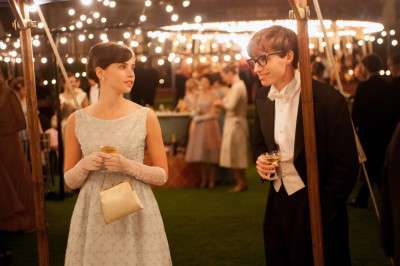James Marsh’s “The Theory of Everything” is a journey through time. It’s not surprising, considering the movie is about Stephen Hawking, a brilliant physicist, cosmologist and science communicator who has occasionally toyed with the idea of time travel. Hawking’s life has spurred a dozen documentaries and films, of which “The Theory of Everything,” released Friday, is the latest, starring Eddie Redmayne as Hawking.

The movie starts at the end with the shape of a wheelchair and of a woman and a young boy walking down a corridor. But immediately, the audience is brought back to the party where Hawking meets Jane, played by Felicity Jones. The two exchange looks and smiles from across the room, and it’s pretty much love at first sight.
But “The Theory of Everything” is not your classic romantic tale. With the same speed at which the romance is constructed, it is also torn down and inspected. Hawking is diagnosed with amyotrophic lateral sclerosis (ALS) at age 21, while in the middle of writing his thesis on black holes. The disease will leave him paralyzed, and the doctors give him roughly two years to live.
The palette of the movie abruptly changes from pastels to darker hues. The open spaces of the University of Oxford’s campus are exchanged with claustrophobic dorm rooms and hospital beds. As Hawking grows more and more depressed, the scene around him changes, and his obsession with time increases.
Jane storms — literally — within that space wearing light blue gowns and headbands, representing the innocence of her decision to battle the disease alongside Hawking. From this moment on, the movie becomes a deep psychological study of the relationship between the two and its evolution through time.
The question of astrophysics is, in general, left aside in the film. Hawking is always busy with his work and reflections on the universe, but the viewer is rarely privy to them. David Thewlis, who plays Hawking’s professor, Dennis Sciama, revisits his role as Professor Remus Lupin in the “Harry Potter” films as he tries to help the gifted and doomed “Chosen One” — wait, wrong movie.
Science is offered in small doses by side characters, mostly using food similes. A potato and a pea become a medium in Jane’s hands to describe the incompatibility between the laws that govern the stars and quantum physics. “The Theory of Everything” is not a movie about science, nor does it try to be. It’s a movie about people — and remarkable ones at that.
As Hawking begins his metamorphosis from young and boisterous kid to married and handicapped genius, Redmayne blossoms from an up-and-coming actor to a star. His transformation into Hawking — from the shoulders to the eyebrows to the quizzical grin — are masterful. Prosthetics were used to achieve Hawking’s thin physical appearance and Redmayne acts not just through them but with them, creating a believable and realistic character. The fact that Hawking looses the ability of speech for the entire latter part of the movie and still manages to remain entirely eloquent is due in large part to Redmayne’s interpretation.
Jane and Hawking drift apart through the years as they watch the toils of everyday life diminish the love between them. Hawking allows Jonathan, played by Charlie Cox, to enter their family, first as an assistant and then as a lover for Jane. Elaine, a nurse and therapist played by Maxine Peake, then begins an affair with Hawking. The result is an intricate reflection on family and disability, revolving around flawed and multifaceted characters.
The director’s experience with documentary films, including the Academy Award winning “Man on Wire,” paid off in this biopic. Though sometimes the stiffness of the film slows it down and cedes to sentimentality, Marsh’s attention to detail and history create a lively and authentic world. The movie is filled with flashbacks and flash-forwards that result in Hawking and his now ex-wife Jane examining the events of their lives. “Look at what we made,” says Hawking, in the robotic voice he is known for, as he points at their children. Jane looks back, teary eyed, at the tangible result of a life spent together.
Based on the memoir by the real Jane Hawking, “Travelling to Infinity: My Life with Stephen,” “The Theory of Everything” is not afraid to pry into the details of Hawking’s personal life. One might not leave the theater with a deep understanding of physics and thermodynamics, but will certainly gain insight on very human characters played by an artfully directed cast.






























































































































